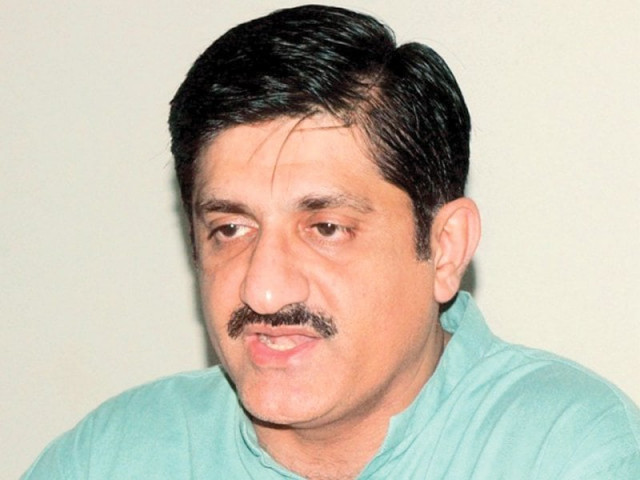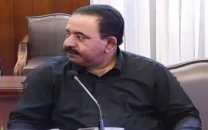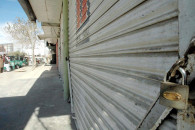Sindh pulls the plug on anti-sectarian operation
Protests by sectarian outfits forced CM to assure groups of no action

Sindh Chief Minister Murad Ali Shah. PHOTO: EXPRESS
An operation against these groups was started in the first week of November last year when the police with the help of paramilitary Rangers arrested many leaders and activists of Shia organisations as well as Sunni extremist group, Ahle Sunnat Wal Jamaat (ASWJ).
The police conducted a search operation at the Siddique-e-Akbar mosque at Karachi’s Nagan Chowrangi locality. During the raid at the mosque – considered as the ASWJ headquarters – the police arrested the group’s secretary general Maulana Taj Hanfi and a dozen other suspects.
Targeted raids 10 ‘criminals’ arrested
Similarly more than three dozen Shia activists were rounded up during a crackdown at imambargahs in Rizvia Society and Nazimabad localities of Karachi. Prominent Shia scholar Allama Mirza Yousaf Hussain and politician Faisal Raza Abidi were among others arrested for inciting violence and terror in the city.
Soon after this crackdown, the religious parties’ leaders took to the streets compelling the government to stop the operation. Later Sindh Chief Minister Murad Ali Shah held separate meetings with various religious parties assuring them that action would not be taken against them.

“This operation was suspended due to pressure of these religious parties that threatened to besiege the Chief Minister House and the Sindh Assembly,” said an official source at the home department.
Sharing details of these 93 seminaries, he said, “Suspected activities of these seminaries were revealed in intelligence reports. We finished their geo-tagging and requested the Centre to put them on the first schedule by banning these seminaries, but all in vain.”
“Initially, Interior Minister Chaudhry Nisar rejected our reports, saying that they were ambiguous and asked to provide further evidence. We have once again sent the dossiers with authentic evidence, but no one has responded to it,” an additional secretary in home department said.
“However, targeted action against these suspects continues,” he added.
A senior police officer told The Express Tribune that in addition to these seminaries, terrorists have also taken shelter in encroached houses around these madrassas where government can take action without difficulty. “The law enforcers were informed to demolish the houses around madrassas by the end of December last year, but suddenly the policy changed,” he added.
“Everyone is silent on this issue,” a DIG level officer said, adding that a committee was also formed under the supervision of the Counter Terrorism Department’s AIG Sanaullah Abbasi.
“The committee was to collate a list of suspects who have recently travelled to and from Afghanistan and have contacts with various extremist elements in Pakistan, but there is no update on it,” he added, Despite many attempts, Abbasi could not be contacted.
But Sindh Chief Minister’s spokesperson said the action still continues and the government has not succumbed to any pressure. “There is no such crackdown, but police take targeted actions with Rangers help,” he said.
According to official sources, Sindh’s apex committee had also discussed this issue in a meeting held in October last year. In the meeting, it was decided that 93 suspected seminaries and clerics [suspected of harbouring terrorists] should be put on the Fourth Schedule before banning their activities and these madrassas and their teachers should not be accorded any official security, but this never happened.
Interfaith harmony: ‘Tolerance is foundation of co-existence’
“We want to take action, but the federal government is a stumbling block,” Maula Bux Chandio, Sindh CM’s former adviser said, adding that each and every proof was presented to Interior Ministry about these madrassas but they have objected to it without any reason.
An ASWJ leader, Umer Muaavia, picked fault with the government decision to take action against 93 seminaries. “I second the interior minister’s response who has clearly said that 98 per cent seminaries in Pakistan have no links with terrorists and action should only be taken against two per cent madrassas.”
He said the Sindh government’s data is not authentic. “They have put Darul Uloom Karachi, one of Pakistan’s largest madrassas run by Maulana Taqi Usmani among these seminaries,” he said, adding that all people who were arrested by the government in operation last year have been released on bail.
Ali Ahmer Zaidi, a spokesperson for Majlis Wahdat-e-Muslimeen (MWM) – a representative organisation of Shias in Pakistan – however alleged that almost all 93 seminaries belonged to Sunni sect and they have nothing to do with it.
“We have always demanded action against terrorists, but the government has adopted a balancing policy. They take action against our innocent people soon after terrorists belonging to banned Sunni outfits are taken into custody,” he said.
Published in The Express Tribune, February 18th, 2017.



















COMMENTS
Comments are moderated and generally will be posted if they are on-topic and not abusive.
For more information, please see our Comments FAQ